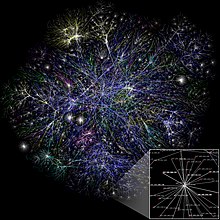Connection
process of joining or uniting entities to create a new entity
(Redirected from Connections)
Connection [variant of British English connexion, from Latin connexionem (nominative connexion (“a conclusion, binding together”), from connectō, an alternative spelling of cōnectō (“I bind together”), from compound of co- (“together”) and nectō (“I bind”)] refers to any means of contact or joining, associative relationships, or regions of unity or identity amidst and between objects or




A
editB
edit- In an extreme view, the world can be seen as only connections, nothing else. We think of a dictionary as the repository of meaning, but it defines words only in terms of other words. I liked the idea that a piece of information is really defined only by what it's related to, and how it's related. There really is little else to meaning. The structure is everything. There are billions of neurons in our brains, but what are neurons? Just cells. The brain has no knowledge until connections are made between neurons. All that we know, all that we are, comes from the way our neurons are connected.
- Tim Berners-Lee, in Weaving The Web : The Original Design and Ultimate Destiny of the World Wide Web (1999), p. 14
- When I invented the web, I didn't have to ask anyone's permission. Now, hundreds of millions of people are using it freely. I am worried that that is going end in the USA. … Democracy depends on freedom of speech. Freedom of connection, with any application, to any party, is the fundamental social basis of the Internet, and, now, the society based on it.
- The Web does not just connect machines, it connects people.
Connection
editD
editE
edit- Everything is connected
- What happens in one part of the world has repercussions on the entire planet. This allows me to reiterate two convictions that I repeat over and over again: "Everything is connected" and "No one is saved alone".
- Pope Francis, in Laudate Deum (2023), paragraph 19
F
edit- She might yet be able to help him to the building of the rainbow bridge that should connect the prose in us with the passion. Without it we are meaningless fragments, half monks, half beasts, unconnected arches that have never joined into a man. With it love is born, and alights on the highest curve, glowing against the grey, sober against the fire. Happy the man who sees from either aspect the glory of these outspread wings. The roads of his soul lie clear, and he and his friends shall find easy-going.
- E. M. Forster, in Howards End (1910), Ch. 22
- Only connect! That was the whole of her sermon. Only connect the prose and the passion, and both will be exalted, and human love will be seen at its height. Live in fragments no longer. Only connect, and the beast and the monk, robbed of the isolation that is life to either, will die.
- E. M. Forster, in Howards End (1910), Ch. 22
- In these English farms, if anywhere, one might see life steadily and see it whole, group in one vision its transitoriness and its eternal youth, connect — connect without bitterness until all men are brothers.
- E. M. Forster, in Howards End (1910), Ch. 33
- Hardship is vanishing, but so is style, and the two are more closely connected than the present generation supposes.
- E. M. Forster, in "Cambridge", in Two Cheers for Democracy (1951)
G
editH
edit- Whatever, in connection with my professional practice, or not in connection with it, I see or hear, in the life of men, which ought not to be spoken of abroad, I will not divulge, as reckoning that all such should be kept secret.
- Hippocrates, in the Oath of Hippocrates (c. 400 BC)
I
edit- Ever since I became a Muslim … I've had to deal with attempts to damage my reputation and countless insinuations seeking to cast doubt on my character and trying to connect me to causes, concepts or sayings which I do not and would never wilfully subscribe to.
- Yusuf Islam (Cat Stevens), as quoted in The Guardian (29 March 2005)
J
edit- You can't connect the dots looking forward; you can only connect them looking backwards. So you have to trust that the dots will somehow connect in your future. You have to trust in something — your gut, destiny, life, karma, whatever. This approach has never let me down, and it has made all the difference in my life.
- Steve Jobs, in an address at Stanford University (12 June 2005)
K
editL
editM
edit- I think we all need connection. Don't we?
- Spoken by Jean-Luc Picard, in Star Trek: Picard episode "No Win Scenario" (March 9, 2023) by Terry Matalas & Sean Tretta
- There is not one of you whose actions do not operate on the actions of others — operate, we mean, in the way of example. He would be insignificant who could only destroy his own soul; but you are all, alas! of importance enough to help also to destroy the souls of others. ...Ye cannot live for yourselves; a thousand fibres connect you with your fellow-men, and along those fibres, as along sympathetic threads, run your actions as causes, and return to you as effects.
- Henry Melvill, in "Partaking in Other Men's Sins", an address at St. Margaret's Church, Lothbury, England (12 June 1855), printed in Golden Lectures (1855); eventually part of this statement become paraphrased in several slight variations, and has usually been misattributed to Herman Melville, i.e.: "We cannot live only for ourselves. A thousand fibers connect us with our fellow men; and along these fibers, as sympathetic threads, our actions run as causes, and they come back to us as effects".
N
editO
editP
edit- Academe needs deprofessionalization and deyuppification. It has to recover its clerical or spiritual roots. Scholarship is an ideal and a calling, not merely a trade or living. Every year at commencement, we put on medieval robes that connect us to a great monastic past.
- Camille Paglia, “Junk Bonds and Corporate Raiders: Academe in the Hour of the Wolf,” Arion, Third Series, Vol. 1, No. 2 (Spring, 1991)
Q
editR
editS
edit- Growing has no connection with audience.
Audience has no connection with identity.
Identity has no connection with a universe.
A universe has no connection with human nature.- Gertrude Stein, The Geographical History of America (1936)
- Whether you want to break free or connect,
it's your choice
but with great courage,
I locked my eyes with yours.
- Not for the body, but for the heart; companion and company are needed.
- Sanu Sharma, Inaam
- Perhaps it is the deprivation that keeps hearts connected.
- Sanu Sharma, Baako Chashma
T
editU
editV
editW
edit- Why are there so many songs about rainbows
And what's on the other side?
Rainbows are visions, but only illusions,
And rainbows have nothing to hide.
So we've been told and some choose to believe it
I know they're wrong, wait and see.
Someday we'll find it, the rainbow connection,
The lovers, the dreamers and me.
- Once again
- Do I behold these steep and lofty cliffs,
- Which on a wild secluded scene impress
- Thoughts of more deep seclusion; and connect
- The landscape with the quiet of the sky.
X
editY
editZ
edit- The thing that we are trying to do at Facebook is just help people connect and communicate more efficiently … Think about what people are doing on Facebook today. They're keeping up with their friends and family, but they're also building an image and identity for themselves, which in a sense is their brand. They're connecting with the audience that they want to connect to. It's almost a disadvantage if you're not on it now.